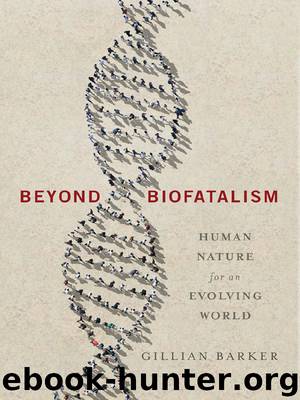Beyond Biofatalism by Gillian Barker

Author:Gillian Barker
Language: eng
Format: epub
Tags: SCI027000, Science/Life Sciences/Evolution, SCI072000, Science/Life Sciences/Developmental Biology
Publisher: Columbia University Press
Published: 2015-10-19T16:00:00+00:00
[ 6 ]
Valuing Change
WHAT ENVIRONMENTS SHOULD WE SEEK to provide for rising generations and for those yet to come? How much should we be willing to invest in creating and sustaining particular kinds of environments? These are intensely practical questions whose answers have implications for our private choices but also for public policy about everything from education to urban design, and from medicine to policing. They are also frankly normative. Can an evolutionary understanding of human psychology help us to answer them?
So far this book has focused on questions about how—and how much—environmental changes could change human patterns of behavior. We’ve seen that these patterns may be more open to environmentally triggered change than most evolutionary psychologists have thought. But this alone means relatively little. We need to know not just what the effects of particular environmental changes would be but which of the possible effects are actually desirable and which of the required environmental changes are actually feasible. The first is a question about values, the second about facts. These interlinked questions are the focus of the rest of this book.
To assess the prospects for environment-driven social change, we need to think about both what we can do and what we should do—about what modifications to current patterns of human development, behavior, and social organization are feasible and what paths toward such change—if any—are good to pursue. Each of these considerations raises numerous finer-grained questions. On the factual side, to assess feasibility we would need to know what changes can be achieved at all, and which among these can be sustained once achieved. By what means can they be thus realized, and with what side effects? What are the likely outcomes should attempts to realize them fail? On the value side, we would need to know what makes an environment or a developmental or social outcome good or bad. Are there objective standards for these valuations, or do the standards vary with context or according to the attitude of those affected? How are diverse and uncertain goods and harms, unevenly distributed across the human population, to be weighed against one another?
Despite the complexity of these questions, evolutionary psychologists often write as if the answers can be read off fairly simply from evolved human nature. Their understanding of the interaction between organism and environment leads them to expect that human psychology will follow the patterns of conservative interactions, the broadly internalist perspective captured by the metaphor of “limited malleability.” From this perspective, the facts and values in play here appear closely intertwined. Human nature is seen as determining the main patterns of individual development and behavior; these in turn fix what is feasible at the social level. Some social arrangements that are easy to imagine cannot be put into practice simply because human nature resists them: you cannot make enough people behave unnaturally enough, consistently enough, to make them work. Recall Robert Wright’s remark that humans “aren’t malleable enough to make communism a productive economic system, and they aren’t malleable enough to create a society of perfect behavioral symmetry between men and women” (Wright 1994a).
Download
This site does not store any files on its server. We only index and link to content provided by other sites. Please contact the content providers to delete copyright contents if any and email us, we'll remove relevant links or contents immediately.
Unwinding Anxiety by Judson Brewer(72065)
The Art of Coaching by Elena Aguilar(52249)
The Fast Metabolism Diet Cookbook by Haylie Pomroy(20930)
Rewire Your Anxious Brain by Catherine M. Pittman(18337)
Healthy Aging For Dummies by Brent Agin & Sharon Perkins RN(16935)
Talking to Strangers by Malcolm Gladwell(12917)
The Art of Thinking Clearly by Rolf Dobelli(9952)
Crazy Rich Asians by Kevin Kwan(8912)
Mindhunter: Inside the FBI's Elite Serial Crime Unit by John E. Douglas & Mark Olshaker(8753)
The Compound Effect by Darren Hardy(8545)
Periodization Training for Sports by Tudor Bompa(7947)
Becoming Supernatural by Dr. Joe Dispenza(7870)
Tools of Titans by Timothy Ferriss(7850)
Wonder by R. J. Palacio(7756)
Crystal Healing for Women by Mariah K. Lyons(7735)
Bodyweight Strength Training by Jay Cardiello(7686)
Therapeutic Modalities for Musculoskeletal Injuries, 4E by Craig R. Denegar & Ethan Saliba & Susan Saliba(7607)
Should I Stay or Should I Go? by Ramani Durvasula(7441)
Change Your Questions, Change Your Life by Marilee Adams(7405)
